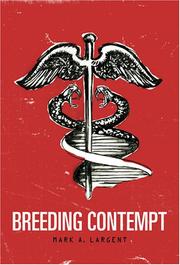| Listing 1 - 10 of 41 | << page >> |
Sort by
|
Book
ISBN: 1283907089 0857002309 9780857002303 9781283907088 9781849051026 184905102X Year: 2011 Publisher: London Philadelphia Jessica Kingsley Publishers
Abstract | Keywords | Export | Availability | Bookmark
 Loading...
Loading...Choose an application
- Reference Manager
- EndNote
- RefWorks (Direct export to RefWorks)
Practitioners in social care are often required to work with clients who do not want to work with them, and these 'reluctant' clients can often be the most challenging, but most rewarding, to work with. This practical, jargon-free book covers all the issues that practitioners are likely to encounter in the course of working with reluctant clients.
Involuntary treatment. --- Social service. --- Medical care. --- Social case work.

ISBN: 1281151424 9786611151423 0813543800 9780813543802 9781281151421 6611151427 9780813541822 0813541824 9780813541839 0813541832 Year: 2007 Publisher: New Brunswick, NJ
Abstract | Keywords | Export | Availability | Bookmark
 Loading...
Loading...Choose an application
- Reference Manager
- EndNote
- RefWorks (Direct export to RefWorks)
Most closely associated with the Nazis and World War II atrocities, eugenics is sometimes described as a government-orchestrated breeding program, other times as a pseudo-science, and often as the first step leading to genocide. Less frequently it is recognized as a movement having links to the United States. But eugenics does have a history in this country, and Mark A. Largent tells that story by exploring one of its most disturbing aspects, the compulsory sterilization of more than 64,000 Americans. The book begins in the mid-nineteenth century, when American medical doctors began advocating the sterilization of citizens they deemed degenerate. By the turn of the twentieth century, physicians, biologists, and social scientists championed the cause, and lawmakers in two-thirds of the United States enacted laws that required the sterilization of various criminals, mental health patients, epileptics, and syphilitics. The movement lasted well into the latter half of the century, and Largent shows how even today the sentiments that motivated coerced sterilization persist as certain public figures advocate compulsory birth control-such as progesterone shots for male criminals or female welfare recipients-based on the same assumptions and motivations that had brought about thousands of coerced sterilizations decades ago.
Eugenics --- Involuntary sterilization --- Castration of criminals and defectives --- Compulsory sterilization --- Eugenic sterilization --- Sterilization, Eugenic --- Sterilization of criminals and defectives --- Involuntary treatment --- Sterilization (Birth control) --- Reproductive rights --- History.

ISBN: 1593321821 9781593321826 9781593320959 1593320957 Year: 2005 Publisher: New York LFB Scholarly Pub.
Abstract | Keywords | Export | Availability | Bookmark
 Loading...
Loading...Choose an application
- Reference Manager
- EndNote
- RefWorks (Direct export to RefWorks)
Sex offenders --- Civil commitment of sex offenders --- Offenders, Sex --- Predators, Sexual --- Sex criminals --- Sexual offenders --- Sexual predators --- Criminals --- Commitment of sex offenders --- Involuntary treatment --- Government policy
Book
ISBN: 0231544286 9780231544283 9780231182669 9780231182676 023118266X 0231182678 Year: 2018 Publisher: New York
Abstract | Keywords | Export | Availability | Bookmark
 Loading...
Loading...Choose an application
- Reference Manager
- EndNote
- RefWorks (Direct export to RefWorks)
In an update to this classic text, Ronald H. Rooney and Rebecca G. Mirick explore the best ways to work with unwilling clients. This book provides a framework for understanding the legal, ethical, and practical concerns, offering theory, treatment models, and specific practice strategies to facilitate collaborative, effective working relationships.
Social service --- Involuntary treatment --- Coerced treatment --- Coercive care --- Coercive treatment --- Compulsory treatment --- Enforced treatment --- Forced treatment --- Treatment, Involuntary --- Patients --- Therapeutics --- Informed consent (Medical law) --- Legal status, laws, etc.
Book
ISBN: 9783954661893 3954661896 Year: 2011 Publisher: Berlin [Germany]
Abstract | Keywords | Export | Availability | Bookmark
 Loading...
Loading...Choose an application
- Reference Manager
- EndNote
- RefWorks (Direct export to RefWorks)
Long description: Nach wie vor bestehen Unsicherheiten hinsichtlich der Indikation zivilrechtlicher und öffentlich-rechtlicher „Zwangsunterbringungen“ und Widersprüchlichkeiten in der Rechtsprechung der Obergerichte bezüglich der „Zwangsbehandlung“. Was ist Eigen- und was ist Fremdgefährdung? Aus welchem Grunde darf man welchen Patienten gegen seinen Willen in die Klinik bringen, dort gegen seinen Willen festhalten und darüber hinaus gar gegen seinen Willen behandeln? Nicht nur die Ausgestaltung der Begegnungssituation zwischen Patient, Arzt, Jurist und Öffentlichkeit, sondern auch das Gesetz über die Patientenverfügung vom 29.07.2009 fordern eine schlüssige Übersicht, die diese Problematik aktuell diskutiert und dem Leser in Fragen der Zwangseinweisung und Zwangsbehandlung Sicherheit gibt. Quote: „Ein unverzichtbarer Wegweiser und allen in die Problematik nolens volens Verwickelten nahezu vorbehaltlos zu empfehlen!“
Involuntary treatment. --- Coerced treatment --- Coercive care --- Coercive treatment --- Compulsory treatment --- Enforced treatment --- Forced treatment --- Treatment, Involuntary --- Patients --- Therapeutics --- Informed consent (Medical law) --- Legal status, laws, etc.
Book
ISBN: 1003213219 1000510387 1032073136 1032120940 Year: 2022 Publisher: Taylor & Francis
Abstract | Keywords | Export | Availability | Bookmark
 Loading...
Loading...Choose an application
- Reference Manager
- EndNote
- RefWorks (Direct export to RefWorks)
This book explores the challenges of informed consent in medical intervention and research ethics, considering the global reality of multiculturalism and religious diversity.
Informed consent (Medical law) --- Consent, Informed --- Consent to treatment --- Disclosure, Medical --- Medical disclosure --- Treatment, Consent to --- Consent (Law) --- Medical ethics --- Medical personnel --- Patient education --- Involuntary treatment --- Patient refusal of treatment --- Malpractice --- Religion and beliefs
Book
ISBN: 3319267469 3319267485 Year: 2016 Publisher: Cham : Springer International Publishing : Imprint: Springer,
Abstract | Keywords | Export | Availability | Bookmark
 Loading...
Loading...Choose an application
- Reference Manager
- EndNote
- RefWorks (Direct export to RefWorks)
This book presents the legal context and describes the ethical and practical challenges when using coercive measures in forensic psychiatric settings. A wide range of aspects relevant to the use of such measures, including environmental, patient-related, and staff-related factors, are explored, and the experience of coercive interventions is described from the staff and the patient perspective. Differences in jurisdictions and examples of good practice are highlighted. The authors are from a range of professional backgrounds, ensuring breadth as well as depth in discussion of the topic. The use of coercive measures, in particular restraint, seclusion, and involuntary medication, for the control of aggression in psychiatry remains controversial. Forensic mental health care deals with individuals who pose a risk to others and often present with significant management problems within institutions. The care of patients in these settings gives rise to debates about the balance between care and safety, and between the interests of the patients and those of the wider society to be protected. Despite these tensions, limited research has been conducted specifically on the use of coercive measures in forensic mental health care. This volume aims to fill the gap and will be of value to all professionals working in forensic psychiatric settings as well as to those working in general psychiatric and custodial settings, law professionals, and patients.
Medicine. --- Forensic medicine. --- Psychiatry. --- Medicine & Public Health. --- Forensic Medicine. --- Involuntary treatment. --- Involuntary treatment --- Forensic psychiatry. --- Forensic psychiatry --- Moral and ethical aspects. --- Coerced treatment --- Coercive care --- Coercive treatment --- Compulsory treatment --- Enforced treatment --- Forced treatment --- Treatment, Involuntary --- Law and legislation --- Medical jurisprudence --- Psychiatry --- Mentally ill offenders --- Patients --- Therapeutics --- Informed consent (Medical law) --- Legal status, laws, etc. --- Forensic medicine --- Injuries (Law) --- Jurisprudence, Medical --- Legal medicine --- Forensic sciences --- Medicine --- Medical laws and legislation --- Medicine and psychology --- Mental health --- Psychology, Pathological --- Medical jurisprudence.

ISBN: 1280439289 1423763521 0199748659 1601295898 9781423763529 9781601295897 9780195036862 0195036867 9781280439285 0195036867 9780199748655 Year: 1986 Publisher: New York : Oxford University Press,
Abstract | Keywords | Export | Availability | Bookmark
 Loading...
Loading...Choose an application
- Reference Manager
- EndNote
- RefWorks (Direct export to RefWorks)
A timely, authoritative discussion of an important clinical topic, this useful book outlines the history, function, nature and requirements of informed consent, focusing on patient autonomy as central to the concept. Primarily a philosophical analysis, the book also covers legal aspects, with chapters on disclosure, comprehension, and competence.
Informed consent (Medical law) --- Consent (Law) --- Declaration of intention --- Justification (Law) --- Consent, Informed --- Consent to treatment --- Disclosure, Medical --- Medical disclosure --- Treatment, Consent to --- Medical ethics --- Medical personnel --- Patient education --- Involuntary treatment --- Patient refusal of treatment --- History. --- Malpractice --- Informed consent (Medical law) - United States - History

ISBN: 1280527048 0195359062 1429400382 9781429400381 9780195359060 9780195085310 0195085310 9781280527043 0195085310 0197729983 Year: 1995 Publisher: New York : Oxford University Press,
Abstract | Keywords | Export | Availability | Bookmark
 Loading...
Loading...Choose an application
- Reference Manager
- EndNote
- RefWorks (Direct export to RefWorks)
This philosophical treatise explores the place of paternalism in caring for others. It provides guidelines for balancing respect for the recipients' autonomy with the good that can be provided by intervening in their lives.
Respect for persons. --- Caring. --- Paternalism --- Autonomy (Philosophy) --- Community life. --- Involuntary treatment --- Associations, institutions, etc. --- Human ecology --- Philosophy --- Coerced treatment --- Coercive care --- Coercive treatment --- Compulsory treatment --- Enforced treatment --- Forced treatment --- Treatment, Involuntary --- Patients --- Therapeutics --- Informed consent (Medical law) --- Parentalism --- Social classes --- Social control --- Social systems --- Conduct of life --- Empathy --- Helping behavior --- Persons --- Moral and ethical aspects. --- Legal status, laws, etc.

ISBN: 1134619049 1134619057 1280182369 9786610182367 0203254449 0203004841 9780203004845 9780415208499 0415208491 9781134619054 0415208491 9781134619047 9781280182365 6610182361 9780203254448 9781134619009 9781138873834 Year: 1999 Publisher: London New York Routledge
Abstract | Keywords | Export | Availability | Bookmark
 Loading...
Loading...Choose an application
- Reference Manager
- EndNote
- RefWorks (Direct export to RefWorks)
Coercive Care asks probing and challenging questions regarding the use of coercion in health care and the social services. The book combines philosophical analysis with comparative studies of social policy and law in a large number of industrialized countries.
Involuntary treatment --- Therapeutics. --- Medical treatment --- Therapy --- Treatment of diseases --- Treatments for diseases --- Clinical medicine --- Coerced treatment --- Coercive care --- Coercive treatment --- Compulsory treatment --- Enforced treatment --- Forced treatment --- Treatment, Involuntary --- Patients --- Therapeutics --- Informed consent (Medical law) --- Moral and ethical aspects. --- Legal status, laws, etc.
| Listing 1 - 10 of 41 | << page >> |
Sort by
|

 Search
Search Feedback
Feedback About UniCat
About UniCat  Help
Help News
News